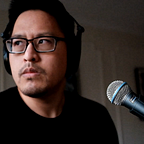What Am I Hearing?
As we lay the first bricks of our musicianship foundation, one question helps us get a sense of where to begin; it snaps everything into focus.
What am I hearing?
Believe it or not, your answer to this question will reveal a lot about where you are in your approach to a number of musical situations. If your answer to this question is clear and confident, you will be clear and confident in your approach to music. And the opposite is also true. If your answer to this question is hazy, lacking in concreteness, well… your answers about music will feel vague, and your foundation will be full of soft spots, unable to support the musical tasks we want to perform on top.
Think of one of your favorite songs, or a recent song with which you’ve become obsessed. How would you usually approach learning this song?
Most of us would hope to find a tab, a tutorial, or some sheet music that could instruct us in the way of the song. But despite the convenience and accessibility of these resources, all of them fall short of a better goal (assuming the tabs, tutorials, and sheet music are at all accurate). Like trying to learn a language from a textbook, figuring out what to do musically from a set of visual cues sets earnest learners up for massive disappointment. And yet so many have settled for less this way, frustrated, stagnated in their musical journey.
When we are conditioned to perpetually look outside for help, we fail to look within to ourselves, to our ears and to our understanding of the songs we love.
If we are going to have any hope of becoming musically mature, the real goal must not be to reach for these quick fixes, but to do the hard work of developing our musical selves.
It might feel uncomfortable, even backwards, to listen and think first. But the truth is that these visual aids we’re accustomed to are crutches. Crutches are fine when you’re injured, but continuing to use crutches keeps you from developing your otherwise healthy musical legs towards running. A finely tuned sense of what’s happening in music is worth more than all of the tabs and tutorials in the world.
So let’s answer a more challenging question: “How would a musician approach learning this song?”
Would they rely wholly on a tab or a tutorial? Absolutely not! So what would a musician do differently? They would listen and think about what they’re hearing! And, in doing so, they ultimately get more out of the song.
Here, I would offer, are some questions a musician might ask themselves in this situation:
- What are the different parts of this song?
- What exactly is happening in this song? How would I describe it?
And more specifically,
- What is happening in the melody?
- What is happening in the harmony?
- What is happening in the rhythm?
And ultimately,
- Can I apply what I’m hearing to my instrument?
As you can hopefully now see, “What am I hearing?” is a question that cuts to the heart of it. It gets at the core of what we want out of our musical journey. And the amount of confidence in your approach to making music will always reflect your grasp of what is happening in the music you hear.
So, what are you hearing…?
